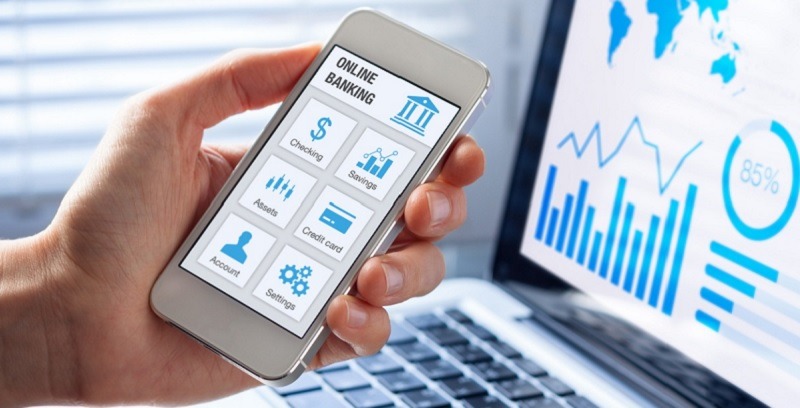 As technology gets better and better, so does everything else around us. Activities that used to require people to physically participate like shopping, is now moving online.
As technology gets better and better, so does everything else around us. Activities that used to require people to physically participate like shopping, is now moving online.
If you didn’t already know, you can even do all of your banking online too! Online banking is so popular, it is actually the preferred method of banking of nearly two-thirds of Americans.
Although online banking was designed to give you a convenient and simpler way to bank, there are some things you need to know before committing to this banking style.
Continue reading to learn What Is Online Banking and learn all the ins and outs to make sure you come out on top.
We recommend online banking with institutions like CIT Bank, Discover, HSBC, and more from our extensive list of the latest banking promotions.
What is E-Banking?
Essentially, E-Banking is any form of banking that is done online. Even your local bank that seems old style offers some form of digital banking, whether it be seeing your most recent transactions or banking history online.
Generally, when people hear “online banking”, they imagine a bank that operates completely online and does not have any physical branches.
There are some online banks that do operate completely online even though there may be a building that their workers go to work. Every transaction you do must be made online or through the phone, so you’ll never have to wait in line.
Advantages of Online Banking
Online banking is becoming more and more popular, not only for consumers, but for banks as well. With online banking, banks don’t have to pay pricey buildings, tellers, cubicles, or those fancy tubes that take your check to the teller.
With all the savings the banks make from not having these physical things, they can pass on those savings to their customers.
Convenience in Virtual Banking
Don’t you just hate waiting in line at the bank when you have a busy day ahead of you? If you totaled all the hours you waited in line at a bank, how much time did you waste?
This factor alone is the biggest reasons why many people have switched to virtual banking. You can do all of your banking transactions from the comfort of your home without the need of putting any of your going-out clothes on.
Higher Savings Rate with Internet Banking
The second most compelling factor is that most of the time you can get higher interest rates on all of your bank accounts. These interest rates are nothing to laugh at either because they can be much higher than what traditional banks offer.
| Account Type | *Average Bank | Top Online Bank |
| Savings | 0.09% | 2.35%, ABC Bank |
| Interest Checking | 0.06% | 3.00%, DEF Bank |
| Money Market | 0.16% | 2.30%, GHI Bank |
| 12-Month CD | 0.59% | 2.89%, JKL Bank |
| 60-Month CD | 0.23% | 3.60%, MNO Bank |
*Bank interest rate percentages are just averages. Your miles may vary.
Fewer Fees
The average customer may not know this, but traditional banks tend to have quite a few small fees that build up. Whether it be dormant account fees, early account closing fees, overdraft fees, or paper statement fees, these fees can really start to make a dent in your account.
Many online banks, but not all, offer way less fees or a better fee structure, so it won’t get out of control like traditional banks. Because not all online banks are created equal, be sure to check their fee schedule to make sure the online bank suits you and our needs.
Typically, these online banks have lower overhead costs, so they can lower their fees to persuade customers to do business with them.
More Features of Digital Banking
If you’re the type of person that likes to organize their spending and manage how much they spend, then you know all about companies like FinTech that have money apps that connects your digital bank account to an app to create charts for you to view your spending.
Not all banks offer seamless integration of their accounts to apps, but since digital banking works with technology to achieve their goals, it is a lot easier to sync your bank account with these financial products.
Additionally, online banks tend to offer additional features with the account itself. Some of these features may include budgeting programs, forecasting tools, bill pay, account alerts, or even simple things like the ability to view images of checks that you’ve written.
ATM Networks
A small disadvantage online banks have is that you can’t go to a branch and physically withdraw any cash. Because of this reason, many online banks tend to have generous ATM policies.
Many online banks don’t charge you an ATM fee or will partner up with ATM networks such as COOP Network, Allpoint, or MoneyPass. Some online banks will actually reimburse you whenever you use an ATM that is out of their network.
Portability
Moving to a new place can be a hassle, but it’s an even bigger hassle when you have to switch banks. Online banks tend to offer an app that allows you to check all of your transactions even if you’re out of town. Basically, you’ll have your bank in your pocket at all times.
Disadvantages of Online Banking
After reading all the benefits we’ve listed above, you’re probably all set on opening up a bank account with an online bank. However, there are trade offs you have to make in order to have those good things.
No Face-to-Face Interaction
Having that weekly friendly talk with your favorite bank teller is one of the things you’ll miss with online banking. However there are a couple of other downsides beside being social that comes with online banking.
For example, if you needed a loan or a large sum of money, you would want a person who knows your issues to help you out and values your personal connection.
This isn’t saying that online banks don’t offer this too, in fact they have excellent customer service, but when it comes to issues like this, you would want to have a face-to-face conversation with teller to make sure you get everything settled.
If Your Internet Goes Out, It’s Harder to Bank
The biggest element of virtual banking is having the ability to go online whenever you please. However, if you have unreliable internet services, then having a stable internet connection may be an issue.
Having no internet isn’t the end of the world. If you do not have access to a source of internet, you can always call up your bank if you have any questions or concerns.
Obviously, this makes some of the perks of virtual banking, such as adding your most recent transactions into your budgeting apps or seeing images of checks you’ve recently written, but basic tasks are still doable.
Cash Transactions May Be Difficult
As good as virtual banking may seem due to its convenient style. One of the things that might be missed is the ability to easily gain access to cash, both bills and coins.
Trying to obtain cash may be a little more difficult if you choose an online bank. Sure ATMs are an option, but they only give out cash in increments of $20, so if you need smaller denominations, it may be more difficult.
No Notary Services
Many people may not even know what a notary service is, but to put it simply. Notary services can be a power-of-attorney, a transfer of your retirement accounts, or a signing of a remote deed-in-lieu-of-foreclosure.
So not having a notary service ready when you need it to participate in these actions can be an obstacle.
Before, people would find free notaries at their local bank branch, but virtual banks don’t have physical branches, so customer won’t be able to take advantage of this path.
Virtual bank customers can still find notaries at banks and other official locations, but they might be charged a fee for their services.
Online Banking FAQ
If you’re considering or have ever considered making the switch to online banking, here are a list of the most popular questions customers might have.
- Is Online Banking Safe? It is completely as safe as traditional banking. Generally, most banks and credit unions are either insured by the FDIC or the NCUA, respectively. So if your online bank goes downhill, then you’re insured for up to $250,000 per bank. Regarding your digital information, both traditional banks and online banks will track that information, so there’s no difference in information security.
- How Do I Open an Account with an Online Bank? Opening an account will vary per online bank, but both traditional and virtual banks will require you to verify your identity when trying to open a new bank account. This means providing a Social Security Number and some form of I.D., such as driver’s license or passport. You might also need to mail in a form with your physical signature on it.
- How Much Does Online Banking Cost? Costs to open up an account will vary for each bank. However, like how we’ve discussed earlier in the post, online banks tend to charge fewer fees than traditional banks.
- What Services Do Online Banks Offer? Services will vary depending on which online bank you choose to do business with. Most virtual banks will at least have checking and savings accounts. Don’t be surprised to see certificates of deposit, money market accounts, and IRA accounts. Some online banks will even go above and beyond to offer financial products, such as loans, investment accounts, business accounts, and credit cards.
 |
 |
Bottom Line
Both banking services have their pros and cons, so there is no definitive answer as to which banking service is the best for you. If you like doing your banking face to face and tend to use cash a lot, then a traditional bank may work the best for your.
However, if you want to earn the best rates possible as well as bank from anywhere you want, then virtual banking might be the best option for you.
To get the best of both worlds, people will opt for a hybrid approach. For example, you might have an online bank account for everyday needs and an account at a local bank for when you need access to cash or physical banking services.
If you’re interested in posts like this, check out our list of Credit Card Bonuses here on HMB!



